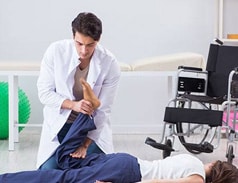Parnashree is sharing four exercises to improve your pelvic/hip muscle strength and stability to help with SIJ problems.
Let’s first talk about why this is important. Local pelvic muscles support your sacroiliac joints (or SI joints). You have two SI joints, one on the right and left. These joints are formed by the connection between the end part of your spine and pelvis. SI joints are extremely stable & strong and as mentioned earlier they are supported by strong ligaments and pelvic muscles. Sometimes people experience pain over their SIJ, which can be due trauma, pregnancy related or can be due to increased or decreased local pelvic muscle activation.
If you are experiencing pain over the SIJ or slightly below it, it may be possible that the joint has become sensitive. If this is you, a physiotherapy assessment with one of our physios will help with sacroiliac joint dysfunction.
Let’s get onto the exercises which will help improve your pelvic stiffness and stability. It’s important that you don’t do these if you have SIJ pain at the moment, as it needs to be correctly assessed. These exercises are for people who have known SIJ dysfunction and their acute pain has been managed. These are the exercises that will prevent the pain from coming back.
Exercises For Sacroiliac Joint Pain
Bridging
The first exercise is called bridging, which is for your buttock muscles or the glutes. Lie on the floor/bed, bend your hips and knees and lift your bottom up and down. You can progress this either by bridging with toe raises or holding the bridge position and lifting one leg or bridging on one leg.
Iliopsoas Theraband March.
The second exercise is for the front hip muscles. Tie a theraband on your foot. Bring both of your legs in hip and knee 90-90 position, straighten one leg and bring the other leg down and pull it back up. Repeat the same for the other leg.
Cat and Camel.
The third one is for TA and multifidus (these are the muscles of the back and abdomen which are part of your pelvic muscles). To start with cat and camel in the lumbar spine – focusing on pelvic movement and keeping the thoracic spine stable. Progress this to maintaining the posterior pelvic tilt and straightening the leg in extension.
Lat Pull-downs.
The last one is theraband/machine lat pull-downs, an upper-body exercise. Grasp the ends of the band above shoulder height with your elbows straight. Bend your elbows and bring your hands to your shoulders, pulling the band down and back. Hold and slowly return.
If you think you have SIJ dysfunction, or if you know you do, but are struggling to manage it – our physios can assess your SIJs and explain what is causing your problem. We’ll then start you on a plan to get you pain-free and strong. Click on our link to book an appointment or give us a phone call.

